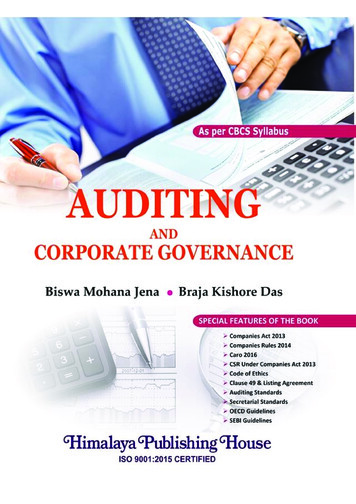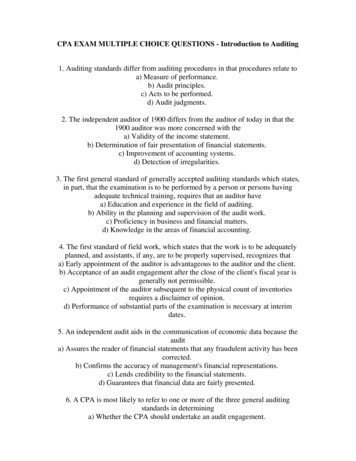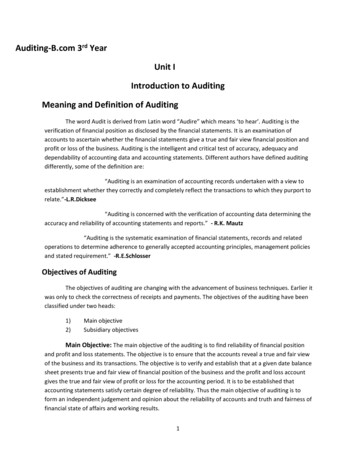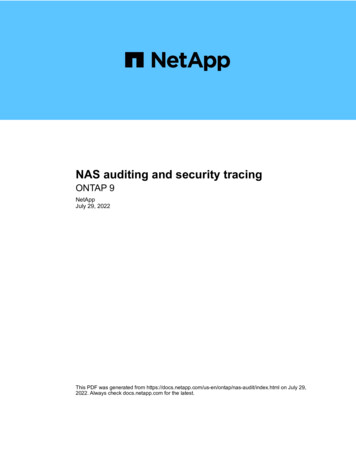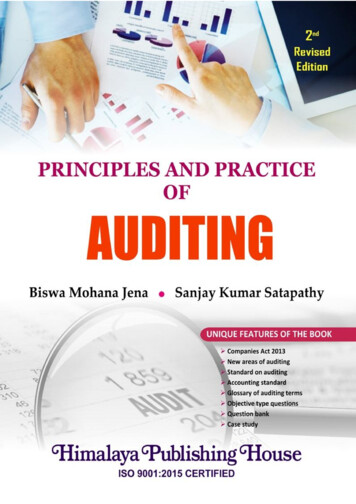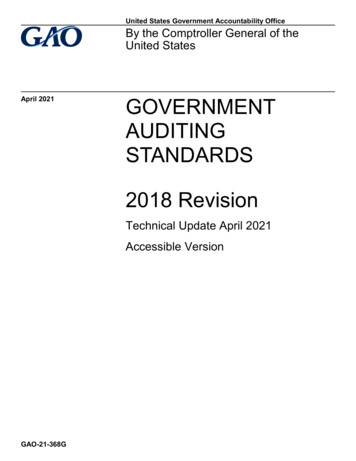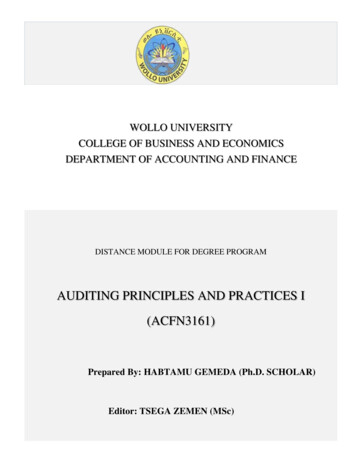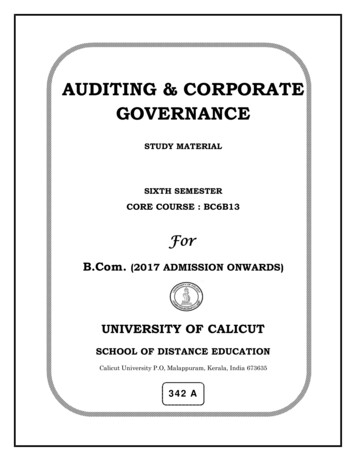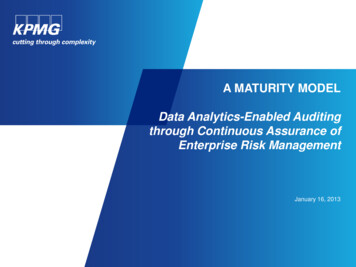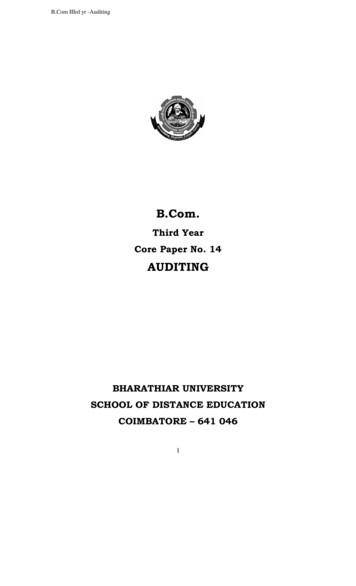
Transcription
B.Com IIIrd yr -AuditingB.Com.Third YearCore Paper No. 14AUDITINGBHARATHIAR UNIVERSITYSCHOOL OF DISTANCE EDUCATIONCOIMBATORE – 641 0461
B.Com IIIrd yr -Auditing(Syllabus)Core Paper 14B.Com. AuditingObjectives : To familiarize the students with the principles of auditing.Unit – IAuditing– Origin – Definition – Objectives – Types – Advantages and Limitations –Qualities of an Auditor – Audit Programmes.Unit – IIInternal Control – Internal Check and Internal Audit –Audit Note Book – Working Papers.Vouching – Voucher – Vouching of Cash Book – Vouching of Trading Transactions –Vouching of Impersonal Ledger.Unit – IIIVerification and Valuation of Assets and Liabilities – Auditor’s position regarding thevaluation and verifications of Assets and Liabilities – Depreciation – Reserves andProvisions – Secret Reserves.Unit – IVAudit of Joint Stock Companies – Qualification – Dis-qualifications – Various modes ofAppointment of Company Auditor – Rights and Duties – Liabilities of a Company Auditor– Share Capital and Share Transfer Audit – Audit Report – Contents and Types.Unit - VInvestigation – Objectives of Investigation – Audit of Computerised Accounts –Electronic Auditing – Investigation under the provisions of Companies Act.Books for Reference1. B.N. Tandon, “Practical Auditing” ,S Chand Company Ltd2. F.R.M De Paula, “Auditing-the English language Society and Sir Isaac Pitmanand Sons Ltd,London3. Spicer and Pegler, “Auditing: Khatalia’s Auditing”4. Kamal Gupta, “Auditing “ , Tata Mcgriall Publications2
B.Com IIIrd yr -II2Internal Control46UNIT-III3Verification of 23
B.Com IIIrd yr -AuditingUNIT- ILESSON-1AUDITINGCONTENTS1.0AIMS AND OBJECTIVE1.1INTRODUCTION1.1.1 Origin of Auditing and Evolution1.1.2 Early developments in India1.1.3 Post independence developments1.2MEANING AND DEFINITION OF AUDITING1.2.1 Important features of audit1.3DEVELOPMENT OF AUDITING1.4DISTINCTION BETWEEN BOOK – KEEPING, ACCOUNTANCY ANDAUDITING1.4.1 Where an auditor acts as accountant1.5DISTINCTION BETWEEN INVESTIGATION AND AUDITING1.6OBJECTS AUDIT1.6.1 Evaluation of objectives and techniques of Auditing1.6.2 Opinion as regards financial statements1.6.3 Detection and prevention of errors1.6.4 Clerical errors.1.6.5 Errors of principle1.6.6 Compensating errors1.6.7 Errors of duplication1.6.8 Detection and prevention of fraud1.6.9 Auditors position as regards fraud and errors1.7CLASSIFICATION OF AUDIT1.7.1 General and specific audit1.7.2 Continuous / periodical / balance sheet audit1.8ADVANTAGES OF AUDIT1.8.1 For the enterprise1.8.2 For owners of the enterprise1.8.3 For others1.9LIMITTIONS OF AUDITING1.10 QUALIFICTION AND QUALITIES OF AUDITOR4
B.Com IIIrd yr -Auditing1.0 AIMS AND OBJECTIVEThis unit is consisting of basics of auditing, evaluation of auditing, how it is differentiatedwith book keeping, accounting, and also investigation. Here there is an elaboratediscussion on objects of auditing. Auditing also classified under two major categories arediscussed. Then what are all the advantages and limitations are explained. This unit endswith the discussion about qualities and qualifications of auditing.1.1 INTRODUCTIONAuditing is a system of check upon persons who, in the course of their work, handlereceipts and expenditure of money belonging to others. It has been in practice since timeimmemorial. There is historical evidence suggesting that household accounts of earlyrulers were kept by at least two persons, independently of one another, to keep a check onmistakes and misappropriations. In the Mauryan, Greek and Roman empires, there was afool-proof system of control over public revenue and expenditure.Private business houses and estates were also subject to audit examinations though, due tosmall number of transactions and crude methods of accounting, such examination wasquite simple and brief. The person appointed to exercise the check would only hear thebusiness records as read out to him by the accounting parties. That explains the origin ofthe world “audit” derived from the lain audire, i.e., to hear.1.1.1 Origin of Auditing and EvolutionThe Renaissance in Italy in the fifteenth century, led to a rapid growth of industry andcommerce. Due to increase in the number and complexity of business transactions, therewas an ever –growing need to ensure an independent and expert review of the accuracyand reliability y of business records.An independent review of the accounts of business enterprises became still morenecessary after the advent of the joint stock company, marking separation between theownership and management of business. Thus, professional auditing received statutoryrecognition with the passing of the British Companies Act in 1862, and “detection offraud” became the primary objective of auditing. In the United States, professionalauditing was introduced in 1900 and ascertaining of “actual financial condition earning ofan enterprise,” was set out as the main objective of auditing.1.1.2 Early developments in IndiaIn India, the law relating to auditing followed the British model, the joint Companies Actof 1857, made a provision for an optional annual audit of companies.5
B.Com IIIrd yr -AuditingCompulsory audit in the case of companies was introduced by the Companies Act of 1913,with specific provisions as to maintenance of books of account, contents of the BalanceSheet, etc. Qualifications, duties and rights of the auditor, including the procedure of hisappointment, were also legally prescribed. Accordingly, only a person holding a certificatefrom the local Government, or a member of an association or society duly recognized forthis purpose, could act as an auditor. In 1918, the Government of Bombay initiated ascheme for training of professional accountants and those passing the examination wereawarded the Government Diploma in Accountancy (GDA). Persons holding the GDAcould practice accountancy throughout the British India.In 1930, the accounting profession was brought under the control of Central Governmentto ensure uniformity in standards throughout the country. The Central Governmentmaintained a Register of Accountants and also established the Indian Accountancy Boardto advise it on matters relating to the profession.1.1.3 Post independence developmentsIn, 1949, Parliament enacted the Chartered Accountants Act whish has vested themanagement and control of the accounting profession the members of the profession itself.Accordingly the Institute of Chartered Accountants of India (ICAI) has been set up underthe Act. The affairs of the ICAI are managed and controlled by a Council comprisingelected representative of charted accountants and nominees of the Central Government.The Council lays down standards of education, training, professional conduct anddiscipline. The ICAI has issued a number of Statements on Auditing, Statements onStandard Auditing Practices (SAPs) and Accounting Standards (AS) for guidance of themembers of the persons.The Companies Act 1956 has made additional provisions as regards maintenance ofaccounts and audit. Accordingly, only independent persons duly qualified and trained inthe profession can act as statutory auditors in the case of company. The scope of duties,rights and liabilities of the auditor and requirements as to annual accounts and the auditreport, have also been enlarged.The Companies Act 1956, also prescribes a cost audit it the case of specified companies tobe conducted by a cost and works accountant within the meaning of the Cost and WorksAccountants Act of 1959.The Income-tax Act 1961, has made the audit of accounts of certain assesses compulsory,which has further contributed to the growth of the profession.1.2 MEANING AND DEFINITION OF AUDITINGIn the main, auditing is concerned with verification of accounting and financial recordswith a view to determining their accuracy and reliability.6
B.Com IIIrd yr -AuditingSome important definitions of auditing may now be examined:Institute of Chartered Accountants of India: “Auditing is a systematic and independentexamination of data, statements, records, operations and performances (financial orotherwise) of an enterprise for a stated purpose. In any auditing situation, the auditorperceives and recognizes the propositions before him for examination, collects evidence,evaluates the same and on this basis, formulates his judgment which is communicatedthrough his audit report.”Spicer and Pagler: “An audit may be said to be such an examination of the books,accounts and vouchers of a business as will enable the auditors to satisfy that the BalanceSheet is property drawn up, so as to give a true and fair view of the state of affairs of thebusiness, and whether the Profit and Loss Account gives a true and fair view of the profitand loss for the financial period, according to the best of his information and theexplanations given to him and as shown by the books, and if not, in what respects he is notsatisfied.”F.R.M. De Paula : “An audit denotes the examination of Balance Sheet and Profit andLoss Account prepared by others together with the books, accounts and vouchers relating,thereto, in such a manner that the auditor may be able to satisfy himself and honestlyreport that, in his opinion, such Balance Sheet is properly drawn up so as to exhibit a trueand correct view of the state of affairs of the particular concern, according to theinformation and explanations given to him and as shown by books.”1.2.1 Important features of auditThe main features of an audit may be summed up as follows:Examinations of books, statements: An audit is a critical examination of the books ofaccount and the financial statements drawn from them, including all operations andperformances, whether financial or otherwise. In the view of the Institute of CharteredAccountants of India, auditing is not merely restricted to accounting records but extends toareas such as managerial performance, cost records, etc., by a properly qualified person An audit examination can only be made by a person(or group of persons) who is duly competent for the purpose. Only a person whopossesses the prescribed qualifications and who is wholly independent of the client will bedeemed as competent. The criteria of qualifications and independence have been laiddown in the Companies Act of 1956. on the basis of proper evidence An audit examination is to be made on the basis ofevidential documents such as invoices, money receipts and other records, includinginformation and explanations supplied by authorized representatives of the client. It is theduty of the auditor to carefully assess and evaluate every piece of evidence relevant for hisexamination.7
B.Com IIIrd yr -Auditing to express his opinion as to the truth and fairness of assertions in statements, financialaccounts. The object of the audit examination is to enable the auditor to express hisopinion as regards the truth and fairness of the financial statements prepared by his client.To this end, be must ensure – (a) that the books of account have been maintained asrequired by law, if any; (b) that the Profit and Loss Account (or Income and ExpenditureAccount) gives a true and fair view of the profit or loss of the business for the periodunder review, and the Balance Sheet (or the statement of Affairs) gives a true and fairview of assets and liabilities of the business on the closing date.1.3 DEVELOPMENT OF AUDITINGOver the years, there has been an impressive growth in terms of the scope, objects andtechniques of auditing as well as duties, rights and legal status of the members of theprofession. This has been due to several factors, important among which are as follows:1. Increase in size and complexity of business organizationsDue to increase in the number and complexity of business units following the IndustrialRevolution, new techniques of auditing have been developed to verify a multitude oftransactions. For example, as detailed checking of every transaction is time consuming,the auditor increasingly relies on a sample checking i.e., detailed checking of only alimited number of scientifically selected transactions, after satisfying himself as regardsthe internal control system adopted by the business under audit.Since the audit report is relied upon by a variety of people both inside and outside thebusiness under audit, it is only proper that the auditor is completely independent of thebusiness under audit, such that his opinion, as expressed in his report regarding the resultsof operations as also the financial condition of the business, is free from any bias orpartiality. Notable among the developments which have taken place to ensureindependence and objectivity on the part of the auditor, are provisions in the CompaniesAct 1956, as also the code of conduct formulated by the Institute of CharteredAccountants of India.2. Divorce between ownership and managementEvolution of the joint stock company has resulted in separation between ownership(shareholders) and management (directors) of the affairs of the business. For theshareholders, the financial statements periodically submitted by management are the onlysource of information as to the state of the company’s affairs. However, they may notpossess the required expertise to understand the information presented in the financialstatements. In the circumstance, there has been growing realization of the need for anindependent an competent examination of books of account and financial statements of thecompany so as to ascertain the truth and fairness of the assertions made therein.8
B.Com IIIrd yr -Auditing3. Legislative controlThere are several laws to ensure that business undertakings function within the frameworkof the norms as standards laid down by the Government in the interest of public policy,adding to the development of auditing. The Companies Act 1956, for example, has madeelaborate provisions for maintenance of requisite books of accounts by companies,qualifications of auditors, manner of their appointment and duties, rights and liabilities.4. Judicial pronouncementsThe Courts have imposed exacting obligations on the auditors to conform to the statutoryrequirements as to presentation of financial statements and reporting standards. This hasconsiderably enlarged the scope of liabilities of auditors.5. Statements and standards by professional bodiesThe Institute of Chartered Accountants of India (ICAI) has issued a number of Statementson Auditing, Statements on Standard Auditing Practices (SAPs) and Accounting Standards(AS) for guidance of auditors in India. The International Federation of Accountants hasalso issued several documents which have significantly contributed to the growth of theprofession.6. Electronic data processing (EDP)Lately, it has become common for business undertakings to use electronic computers toprocess transactions, maintain data files, prepare trial balances and other accounting andoperating analyses and reports which significantly affect accounting information used bythe auditor for his examination. The auditor has often to rely on the EDP applications ofthe client to determine the nature, timing and extent of audit tests. This has led todevelopment of several new techniques to assess the risk factors associated with EDP andformulate appropriate audit plan.1.4 DISTINCTION BETWEEN ACCOUNTANCY & AUDITINGBook-keeping:Book-keeping is concerned with keeping a regular, correct and systematic record of dayto-day transactions of an enterprise in suitably ruled books of account. It includes – (a)entering the transactions in various books, such as Purchase Day Book, Sales Day Book,etc., (b) posting them to the relevant accounts in the ledger and (c) totaling those accounts.Much of the work of a book-keeper is clerical in nature and it is performed under overalldirection and supervision of an accountant.Accountancy begins where book - keeping ends. Accountancy in concerned with – (a)checking the work done by the book – keeper, so as to ensure that all financial transactionshave been correctly recorded I the books of account; (b) preparing a trial balance to see9
B.Com IIIrd yr -Auditingthat effect of each transaction has been recorded in relevant accounts in the ledger, (c)preparing financial statements such as Profit and Loss Account and Balance Sheet tocommunicate the results of business operations and financial condition to interestedparties; (d) passing adjustment and rectification entries; and (e) designing a suitableaccounting system to protect the business assets from unauthorized ad improper use and tocomply with legal requirements under the income – tax, sales – tax, company laws, etc.Auditing:Auditing in concerned with making an analytical and critical examination of the books ofaccount, checking and verification of evidence in support of entries appearing the books ofaccount, and ascertaining the authenticity of assertions in the financial statements. Themost important duty of an auditor is to report whether, is his opinion, the Profit and LossAccount represents a true and fair picture of the profit or loss, and the Balance Sheet, atrue and fair picture of the financial position of the business.According to Mautz and Sharaf, “The relationship of auditing to accounting is close, yettheir nature is very different; they are business associates, not parent and child”. The mainpoints of distinction between accountancy and auditing may be recounted as follows:AccountancyAuditing1. It is concerned with collection, classification,summarization and communication offinancial data.2. It measures business events in terms ofprofit or loss and communicates thethe financial condition of the business.3. The accountant is an employee of theenterprise, entitled to regular salaries.4. The accountant may or may not have anyknowledge of audit techniques andprocedures.5. The accountant is not required to submita report on the financial statementsprepared by them.6. The accountant, being an employee,ordinarily works on a permanent basis.101. It is concerned with analytical andcritical examinations of the financialrecords and statements.2. It reviews the measurement andcommunication of financial resultsand condition.3. The auditor is an independent andProfessional competent outsider,whose services are hired for a fee.4. The auditor must know thePrinciples and techniques ofaccounting.5. The auditor is required to submit areport containing his opinion as tothe truth and fairness of assertionsmade in the financial statements.6. The auditor has to be appointedevery year.
B.Com IIIrd yr -Auditing1.4.1 Where an auditor acts as accountantSometimes, the auditor may be required to perform duties on n accounting nature such aspreparation of final accounts, computation of taxable, income, etc. In India, it is customaryfor the chartered accountants to be retained for this purpose.However, in the course of performance of accounting duties, the auditor works purely andsimply as an accountant, accepting at face value the figures and information fathered fromthe books of account, or supplied by his client. He cannot be held liable if the assertionsin the statements or returns prepared by him are subsequently found to be incorrect.In Mrs. Apfel v.Annan Dexter & Co. (1926), the auditors, who had been appointed toprepare tax returns, were accused of being negligent as they had failed to discoverwrongful over drawings made by Mrs Apfel’s sons employed by the business. The Courtrejected the charge and accepted the auditor’s defense that they were only employed asaccountants to prepare Mrs Apfel’s income-tax returns, and to do more.In Leech v. Stokes and others (1937) also, the auditors were appointed to prepare annualProfit and Loss Account for submission to tax-authorities. Given the nature of theirduties, the Court held them nor liable for a subsequent discovery of misappropriation ofcash by employees of the client.1.5 DISTINCTION BETWEEN INVESTIGATION & AUDITINGAn investigation means an enquiry or examination with a fixed object e.g., detection of asuspected fraud, ascertainment of causes of low productivity, continuing losses, highlabour turnover, turnover, inadequate working capital, etc., or evaluation of the work ofrunning business. It may be made on behalf of owners, prospective investors or, in thecase of a company, the Central Government.The points of distinction between an investigation and audit are as follows:ScopeThe scope of an investigation is determined by the objects intended to be achieved by theparty on whose behalf investigation is undertaken. For example, investigation into thecauses of low productivity will only focus on factors such as availability and quality ofraw material, competence, morale and stability of tenure of workers, and so on.Investigation to evaluate the work of a business will be concerned with the value of theassets, and reserves and liabilities of the business, together with its potential andprospects.An audit examination, on the other hand, extends to all factual assertions in the financialstatements with a view to ascertaining their truth and fairness. In a statutory audit, thescope of audit cannot be curtailed, though in an optional audit this can be done, but in thatcase the auditor cannot be held liable for fraud or error in any area which is outside thepurview of his examinations.11
B.Com IIIrd yr -AuditingObjectInvestigation is aimed at ascertaining certain facts, such as fraud, tax liability, value ofshares, or causes of an existing situation such as low productivity, high labor turnover,inadequate working capital, continuing losses, etc. It may also have the object ofevaluating the worth of the business from the point of view a prospective buyer, investor,etc.The object of an audit is to critically examine and make a report on the truth and fairnessof assertions made in the financial statements as to the results of operations (profit or loss)and the state of affairs of the business (position of assets and liabilities)Time coverageThe period covered by an investigation is determined by reference to its objectives. It maybe as brief as a few weeks, or extend to several years. The party on whose behalf andinvestigation is undertaken may change the period even during the course of investigation.However, an audit examination generally covers the accounting year of the client, thoughin the case of a company it may comprise fifteen months.Approach to workAn investigation is aimed to achieve specific objectives. The information required for thepurpose may not be really available. In the circumstance, inquiry for the necessaryevidence will have to go beyond the books and records. This will require the investigatorto be alert and critical enough to identify the clues for getting at the truth. Unlike theauditor, he need not accept any fact or figure at its face value. He must subject it to aclose scrutiny. Only after careful analysis of the relevant evidence, he can develop it toserve the interests of his client.The auditor, on the other hand, only examines and reviews the financial statementsprepared by his client. His objective is of a general nature, namely, to express his opinionon the authenticity of the financial statements. In his case, the standards of strictness ofenquire are not as demanding as in the case of an investigator. He is also not expected togo into the minutest detail of every aspect of his work. He accepts any fact or figure at itsface value, unless there is something apparently suspicious which calls for deeperexamination. It is true that the current requirements as to reporting oblige him to proceedwith his work somewhat in the manner of an investigator, but he cannot be held liable if,in the absence of anything to the contrary, he accepts ay prima facie evidence as true andfair.Work programmeIt may not be possible to provide a standard work programme for an investigation. Even itmay not be possible to devise and identical programme for two specific investigations ofthe same nature. In each case, the programme will depend on the availability of therequired information and this will be determined only as the work proceeds. In fact, at thecompletion of each stage of work, the programme may have to be reviewed.12
B.Com IIIrd yr -AuditingIn an audit, however, the work programme is generally fixed and even where it is flexible;there are variations only in emphasis, but rarely in form.Disclosure requirementsThere are no legal requirements as to disclosure of information in and investigation. Theinvestigator may rearrange the existing data, redraft the accounts, develop new data andprovide support for a particular viewpoint. However, the auditor is legally required toensure complete disclosure of the information as prescribed.ReportThe investigator reports to the persons on whose behalf he has undertaken his work. Hisreport is by way of conclusions drawn by him after an inquiry into the specific facts andcircumstances. He is not required to adhere to any standard form or pattern in the matterof reporting. He need not render any opinion of his own, but he should provide adequatematerial to enable his client to make a correct judgment. For example, in an investigationon behalf of an intending buyer of business, he need not say whether the business is worthpurchasing, or whether it is worth the price demanded. These questions are best left to bedecided by the buyer himself. But since the investigation report will form an importantbasis for judgment by the buyer, the investigator should present his conclusions and theevidence supporting them, in a clear and cogent manner so that the buyer may be able toform a correct judgment.An auditor reports to owners of the business. His report follows a standard form and isconcerned with facts and circumstances which, in an optional audit, are stated in the letterof his engagement and, in the case of statutory audit, in the statute concerned. He onlyexpresses his opinion as to the authenticity of assertions made in the financial statementsand is not required to present evidence is support thereof.1.6 OBJECTS AUDITEvolution of the objects of auditing has followed the evolution of the businessorganization itself. In the early period, for example, due to a small size and simpleoperations of business, audit examination was largely concerned with detection of fraudby employees. The auditor was only responsible to the owners(s) of the organization, andoutsiders had neither any stake nor interest in the affairs of the enterprise.The Industrial Revolution led to a significant increase both in the size and complexity ofbusiness operations. Increasing capita requirements of business led to the birth of a newform of organization, namely the joint stock company, marking separation betweenownership and management. Business enterprises, acquired considerable economicsignificance and many outsiders, eg. Bankers, investors, creditors, government agencies swell as the public in general, came to develop great stakes in the financial sell-being of theenterprises.13
B.Com IIIrd yr -AuditingAll these developments created a new awareness of the need for an independent opinion asto the fairness of the financial statements provided by management. The larger theenterprise and the more remote the parties whose interests coincided with it, the greaterbecame the value of an independent opinion. The much-desired revision in the objectiveof auditing followed, such that now the emphasis shifted to rendering an opinion of thetruth and fairness prepared by the management. Fraud detection, which was for long theprimary objective of an audit, was relegated to the second position.1.6.1 Evolution of Objectives and Techniques of AuditingPeriodAncient – 18501850 - 19051905 – 19331933 – 19401940Stated auditObjectivesDetection of fraudDetection of fraudDetection of clericalerrorsDetermination offairness of reportedfinancial position.Detection of fraudand errorsDetermination offairness of reportedfinancial position.Detection of fraudAnd errorsDetermination offairness of reportedfinancial positionExtent ofVerificationImportance ofinternal controlDetailedSome tests,primarilydetailedDetailed andtestingNot recognizednot recognizedTestingAwakening ofinterestTestingSlightlyrecognizedSubstantial emphasis(Source : The Accountant, October, 1962)The objects of audit may be stated as follows:Primary : 1. To examine the reliability and validity of the financial statements soas to render an opinion of the truth and fairness of the presentationin those statements.Secondary: 2. Detection and prevention of errors, and fraud.14
B.Com IIIrd yr -Auditing1.6.2 Opinion as regards financial statementsAccording to SAP –2 issued by the Institute of Chartered Accountants of India (ICAI),the objective of audit of financial statements is to enable the auditor to express his opinionas regards the truth and fairness of assertions made in those statements. Sec.227 of theCompanies Act requires a company auditor to state whether in his opinion – (a) theBalance sheet of the company gives a true and fair view of the state of the company’saffairs as the end of its financial year; and (b) the Profit and Loss Account gives as trueand fair view of the profit or loss for its financial year.To be able to render an opinion, the auditor must first make satisfactory examination ofthe financial statements ad the accounts and records prepared as per the AccountingStandards (AS) and Standard Auditing Practices (SAPs) issued by the ICAI, and thestatutory requirements if any. While making such examination, the auditor is and must, infact and appearance, act as an independent and professional reviewer. Auditor’sindependence means freedom form any control and influence of interested parties such asthe client-organization, its management and owners. His professio
1.3 DEVELOPMENT OF AUDITING 1.4 DISTINCTION BETWEEN BOOK - KEEPING, ACCOUNTANCY AND AUDITING 1.4.1 Where an auditor acts as accountant 1.5 DISTINCTION BETWEEN INVESTIGATION AND AUDITING 1.6 OBJECTS AUDIT 1.6.1 Evaluation of objectives and techniques of Auditing 1.6.2 Opinion as regards financial statements
